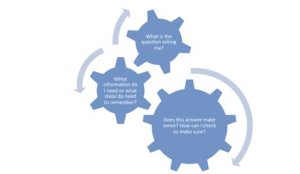Brain-Compatible Study Strategies
Your content has been saved!
Go to My Saved Content.Driving my 15-year-old daughter home from cross country, I asked her where she learned to study. She replied, "Mom, I have never been taught how to study, we just do it because teachers have way too much to teach! They assume we know, and Cornell Notes are their idea of teaching us how to study!" I thought about this conversation and began to create a template that can hopefully assist students to organize, plan and create capacity in their working memories to learn content for the long term.
Below is a brief, simply-stated template on study skills for fifth grade students preparing for a math assessment. The brain's executive functions must be addressed even though our curriculum is full to overflowing, our days and hours are shortened instructionally, and we cannot afford not to integrate these mindful, researched strategies that invite the working memory and prefrontal cortex to engage in the learning process.
Strategies You Need
These study skills may be implemented for any subject and should begin in the upper elementary years before students encounter the more challenging middle and high school curriculums. These strategies will prepare students for the expectation that they will be able to manage time, organize materials and thoughts, and prioritize and plan for the skills they will need to master throughout academic standards and across subject areas.
An Analogy for Fifth Graders
Taking a test is like baking a cake, putting together a model airplane, learning a video game, playing a sport or getting ready for a performance. There are steps to work through before we reach the final answer, skill or solution. If I am baking a cake, I need to get out the recipe, read over the directions and check to make sure that I have all the ingredients. When I look at the image on the box of the beautiful, delicious cake, I get excited about what I am going to create. Taking a test is no different.
- Did I miss an ingredient?
- Did I follow the directions?
- What would work better the next time?

Math Test Preparation
After the Test
Questions to Ask Yourself Now (and For Next Time)
Parent and Teacher Support
When we look at the results of a test, rather than focusing on the final grade with our students, we should ask:
